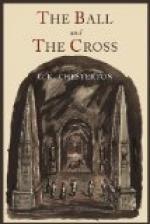To the little man who edited The Atheist, a fiery little Scotchman, with fiery, red hair and beard, going by the name of Turnbull, all this decline in public importance seemed not so much sad or even mad, but merely bewildering and unaccountable. He had said the worst thing that could be said; and it seemed accepted and ignored like the ordinary second best of the politicians. Every day his blasphemies looked more glaring, and every day the dust lay thicker upon them. It made him feel as if he were moving in a world of idiots. He seemed among a race of men who smiled when told of their own death, or looked vacantly at the Day of Judgement. Year after year went by, and year after year the death of God in a shop in Ludgate became a less and less important occurrence. All the forward men of his age discouraged Turnbull. The socialists said he was cursing priests when he should be cursing capitalists. The artists said that the soul was most spiritual, not when freed from religion, but when freed from morality. Year after year went by, and at least a man came by who treated Mr. Turnbull’s secularist shop with a real respect and seriousness. He was a young man in a grey plaid, and he smashed the window.
He was a young man, born in the Bay of Arisaig, opposite Rum and the Isle of Skye. His high, hawklike features and snaky black hair bore the mark of that unknown historic thing which is crudely called Celtic, but which is probably far older than the Celts, whoever they were. He was in name and stock a Highlander of the Macdonalds; but his family took, as was common in such cases, the name of a subordinate sept as a surname, and for all the purposes which could be answered in London, he called himself Evan MacIan. He had been brought up in some loneliness and seclusion as a strict Roman Catholic, in the midst of that little wedge of Roman Catholics which is driven into the Western Highlands. And he had found his way as far as Fleet Street, seeking some half-promised employment, without having properly realized that there were in the world any people who were not Roman Catholics. He had uncovered himself for a few moments before the statue of Queen Anne, in front of St. Paul’s Cathedral, under the firm impression that it was a figure of the Virgin Mary. He was somewhat surprised at the lack of deference shown to the figure by the people bustling by. He did not understand that their one essential historical principle, the one law truly graven on their hearts, was the great and comforting statement that Queen Anne is dead. This faith was as fundamental as his faith, that Our Lady was alive. Any persons he had talked to since he had touched the fringe of our fashion or civilization had been by a coincidence, sympathetic or hypocritical. Or if they had spoken some established blasphemies, he had been unable to understand them merely owing to the preoccupied satisfaction of his mind.




